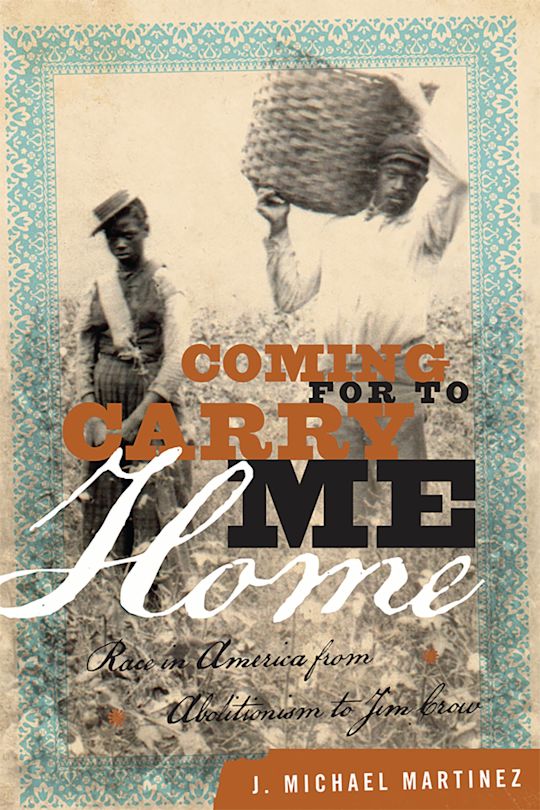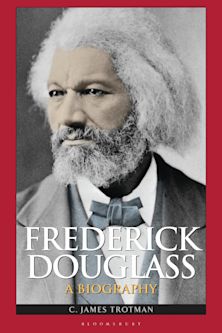- Home
- ACADEMIC
- History
- United States History
- Coming for to Carry Me Home
Coming for to Carry Me Home
Race in America from Abolitionism to Jim Crow
Coming for to Carry Me Home
Race in America from Abolitionism to Jim Crow
For information on how we process your data, read our Privacy Policy
Thank you. We will email you when this book is available to order
You must sign in to add this item to your wishlist. Please sign in or create an account
Description
Coming for to Carry Me Home examines the history of the politics surrounding U.S. race relations during the half century between the rise of the abolitionist movement in the 1830s and the dawn of the Jim Crow era in the 1880s. J. Michael Martinez argues that Abraham Lincoln and the Radical Republicans in Congress were the pivotal actors, albeit not the architects, that influenced this evolution. To understand how Lincoln and his contemporaries viewed race, Martinez first explains the origins of abolitionism and the tumultuous decade of the 1830s, when that generation of political leaders came of age. He then follows the trail through Reconstruction, Redemption, and the beginnings of legal segregation in the 1880s. This book addresses the central question of how and why the concept of race changed during this period.
Table of Contents
Preface and Acknowledgments
Prologue: "We Have the Wolf by the Ear"
1. “The Crimes of This Guilty Land Will Never Be Purged Away but with Blood”
2. “Mr. President, You Are Murdering Your Country by Inches”
3. “The Bondsman’s Two Hundred and Fifty Years of Unrequited Toil
Shall Be Sunk”
4. “An Ungrateful, Despicable, Besotted, Traitorous Man—An Incubus”
5. “The Progress of Evolution, from President Washington to President Grant,
Was Alone Evidence Enough to Upset Darwin”
6. “Radicalism Is Dissolving—Going to Pieces, but What Is to Take Its Place,
Does Not Clearly Appear”
7. “We Have Been, as a Class, Grievously Wounded, Wounded in the House of
Our Friends”
Epilogue: “We Wear the Mask That Grins and Lies”
Notes
Bibliography
Index
About the Author
Product details
| Published | Dec 22 2011 |
|---|---|
| Format | Ebook (Epub & Mobi) |
| Edition | 1st |
| Extent | 334 |
| ISBN | 9781442215009 |
| Imprint | Rowman & Littlefield |
| Series | The American Crisis Series: Books on the Civil War Era |
| Publisher | Bloomsbury Publishing |
About the contributors
Reviews
-
After the long and agonizing struggle of the Civil War, with its lukewarm resolution of the issue of slavery, why did the nation fail in its efforts to take the next steps toward full citizenship for the formerly enslaved? Martinez examines the politics of race relations in the nineteenth century, from Lincoln’s struggles with his personal conscience and with the Radical Republicans to economic, social, and political factors that contributed to unfulfilled promises of Reconstruction and the political atmosphere that resulted in severe injustices codified into law. Martinez focuses on the Radical Republicans, particularly Thaddeus Stevens, Charles Sumner, and Benjamin Wade, and a host of fiery figures who fomented the issue of racial justice, including William Lloyd Garrison, John Brown, Wendell Phillips, and Frederick Douglass. This is a compelling look at the heat and vituperation still evident in contemporary politics, with historical particularities of the nineteenth century, and the underlying issues of race that resonate today. Photos and illustrations, including political cartoons, offer a feel for the political sensibilities of the time.
Booklist
-
In this unflinching portrait, personalities come alive; the policies, philosophies, visions, aspirations, and foibles of political leaders provide high drama as well as compelling history. This book is an important contribution to our understanding of the history of politics during a critical half century of changing race relations.
Orville Vernon Burton, Clemson University
-
J. Michael Martinez, in Coming for to Carry Me Home, offers a sweeping yet incisive history of the politics of race in the tumultuous years between the rise of abolitionism and the advent of Jim Crow. The strength of Martinez’s narrative is the rich mixture of ways the author invites readers to feel the tensions and experience the ambiguities of known and unknown Americans who struggle with the nation’s most enduring moral dilemma.
Ronald C. White Jr., author of A. Lincoln: A Biography
-
In Coming for to Carry Me Home: Race in America from Abolitionism to Jim Crow, J. Michael Martinez claims that "the story of Abraham Lincoln and the Radical Republicans could be understood and appreciated only in the broader context of nineteenth-century race relations." Martinez has written a very nice examination of how the issue of race influenced and directed politicians, antislavery advocates, and policy makers from the years before the war through the end of Reconstruction.
Journal of Southern History



































